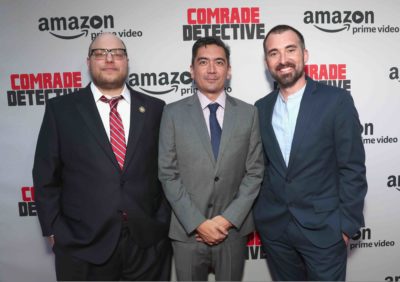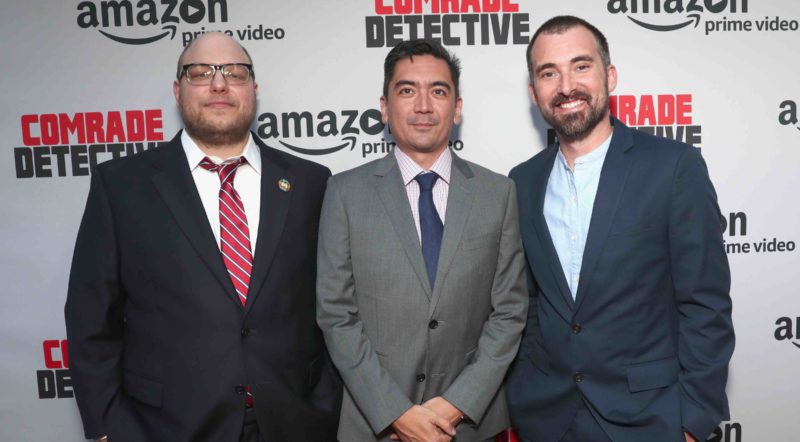INTERVIEW: ‘Comrade Detective’ matches Romanian story with A-list Hollywood talent

Here’s a trippy idea for a TV show.
Shoot a police drama set in 1980s Romania, and then dub the voices of American actors over the dialogue of the Romanians. That’s exactly what happened with Amazon’s new original series, Comrade Detective, featuring the voice talents of Channing Tatum, Joseph Gordon-Levitt, Chloë Sevigny, Nick Offerman, Fred Armisen, Kim Basinger, Mahershala Alia and Debra Winger, among others.
The comedy series can be enjoyed on many different levels. First, there’s the police drama starring Romanian actors Florin Piersic (Detective Gregor Anghel) and Corneliu Ulici (Detective Joseph Baciu). Then there’s the voiceover talent, including Tatum, who plays the Anghel role, and Gordon-Levitt, who plays the Baciu role.
Throw in some jokes about capitalism and Communism, and a murder mystery with many unforeseen plot twists, and audiences will begin to understand the collective creativity of co-creators Brian Gatewood and Alessandro Tanaka, and director/executive producer Rhys Thomas.
“My writing partner and I, Alessandro, were always fans of the Woody Allen film, What’s Up, Tiger Lily?, and as there was a different landscape in television, we wanted to try something like that in TV,” Gatewood said in a recent phone interview. “We looked at global television, and what we found is a fascinating world and a whole world behind the Iron Curtain as well that we never saw growing up, and I don’t think probably 99.9 percent of westerners were even aware of. And when we looked into those shows, we realized it’s kind of complicated to get those rights, and once the idea came about just making our own show, that was really exciting. And then we could both make a show and then dub the show, and then Rhys came on. And we all developed it together and went to Romania to make it.”
Tatum, who also executive produces the series, was involved in those early stages, but most of the American actors came much later in the process. The Romanian police drama was already shot and edited before the dubbing began.
“We shot the whole thing in Romania with a full Romanian crew,” Thomas said. “It was a bit of an education in the Romanian process and working with those guys. I mean, they’re amazing, and shooting in Bucharest, itself a city, is a unique challenge, especially when you’re trying to do a period movie set in the early ’80s. Bucharest is probably one of the most graffitied cities I think I’ve ever seen, and I think it’s probably partially a reaction to the regime they were under. Everybody enjoys a sense of rebellion now, but, yeah, shooting street exteriors in the city of Bucharest was probably the biggest recurring challenge, just clearing and trying to cover up graffiti, satellite dishes, air-conditioning units and modern cars. It’s a really interesting, yet chaotic city.”
Gatewood, Thomas and Tanaka spent time in Romania before starting their shoots. They worked with a Romanian translator to ensure the English script and Romanian script matched as much as possible. Their main objective during these early days was simply to soak in the local culture.
“There were definitely jokes and beats that were sort of written, I’ll say, with an English voice, but then once they went through the Romanian filter, you sort of discovered that they didn’t quite hold the same meaning for the Romanians,” Thomas said. “They are quite a bit more literal in their language than the English language. … You watch the scene play out and realize an actor was making an odd choice, and … you have to go and find out from the script supervisor what the Romanian translation had actually become. And oftentimes, it had completely been mistranslated.”
Gatewood and the others would often conference with the Romanian actors to make sure everyone was understanding the material. “All the actors wanted to understand it from both the Romanian and the English,” Gatewood said. “In fact, Florin and Corneliu, the two Romanian actors, we talked daily about scenes and intentions of scenes to make sure that we were all on the same page, and we would constantly have their input on the material.”
Finding Florin, Corneliu and the rest of the cast took some time. They had a local casting director who needed to fill 80 speaking roles. “It was an interesting casting process because it wasn’t like we were looking to attach stars necessarily,” Thomas said. “We were casting purely for the characters that we had in mind. … Florin was actually introduced to us by our Romanian producer. … He’s quite a large presence in Romania, and he’s actually the son of Romania’s most beloved film actor, Florin Piersic Sr. He’s kind of like the Mike Douglas of Romania with his father being Kirk Douglas, so he came in late. We cast for a while for that role and couldn’t find anyone, and our Romanian producer sort of had the idea of bringing him in. And he agreed, and that worked. And Corneliu came in to audition, and it was immediately apparent that he was the guy. He was really great.”
Later, when the Hollywood actors would come into the recording studio, Gatewood and company had one main goal in mind: keep the right tone. They sent the Romanian scenes to the American actors ahead of the recording session and instructed each actor to bring whatever they thought would be fun.
“We wanted tonally to sort of expand it rather than just making it like a goofy voiceover or dubbed show, so we went for real actors and real comedians, and sort of exploited their talent,” Gatewood said. “It was a lot of fun, and I think everybody who came in — I can’t speak for them — they seemed like they were having a great time. It was a fun, experimental process that I don’t think anyone really had the chance to do before.”
By John Soltes / Publisher / John@HollywoodSoapbox.com
Comrade Detective is now available on Amazon Prime Video. Click here for more information.

